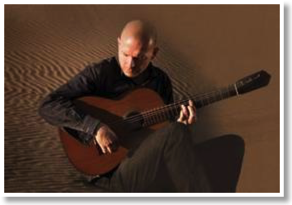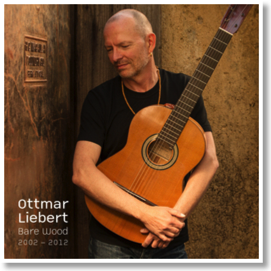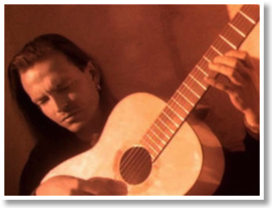Early Music
Celebrated guitarist Ottmar Liebert is a five-time Grammy nominee. He is not only prolific, but has managed to establish a passionate fan base all over the world, as evidenced by his 38 Gold and Platinum sales certifications. This is the second part of the interview by phone with Jupiter Index.
 Jacqueline Perrin: You spoke about your love of books and the literary art form. Do you have other types of art (other than music) that you turn to to stimulate your creativity?
Jacqueline Perrin: You spoke about your love of books and the literary art form. Do you have other types of art (other than music) that you turn to to stimulate your creativity?
Ottmar Liebert: First of all, I think everything stimulates creativity. Whether it’s a conversation with a friend or a stranger or a good meal or playing art, photography. All that stuff I find very inspiring. I happen to know a number of great photographers, their work, very well.
I did go to an art school instead of high school, so I’m very familiar with a lot of titans of fine art painting. I think in general inspiration can come from anywhere. An interesting thing also, is that I don’t know a musician who doesn’t cook. Creating something becomes a second nature. Every musician I know can at least do a few dishes really well. So food, food is definitely another stimulant.
Do you have a specific genre of music that you find difficult to relate to?
Well just the stuff that’s supposed to be difficult to relate to. Be-bop is a little difficult to relate to or 12-tone music is a little difficult to relate to. But there are beautiful examples of those genres that I find very interesting. But it’s not something that I’m naturally drawn to.
I have a wide range of music that I like. For example, I’ve heard from some jazz players that in the 50s a lot of touring bands would get local players who wanted to join in. So the travelling musicians started to make more and more changes in the songs that made it more and more difficult so the local guys would give up and not play. I don’t know whether that’s true, but I think it’s a great story.
 Was there ever a point in your life when you considered doing something else?
Was there ever a point in your life when you considered doing something else?
Yeah, of course. I actually went to art school because I wanted to be a designer. My dad was an industrial designer, and I basically still walk around, and I see when chairs are just not useful or not very good-looking. It’s definitely a little bit of a disease because you cannot get into the hotel without seeing this in the wrong place or this is wrong or this doesn’t work. And then after that I decided I wanted to be a photographer, but I really hated the dark room.
And then basically when I was 19, I went on a train that goes from Paris to Moscow and then I took a trans-Siberian train to the Eastern Harbor, the Soviet Union at the time. And took a boat to Japan and just kept travelling around Asia for a year. Even if we don’t speak each other’s language, we can make music together, and I thought that was such an amazing thing that I decided to become a musician.
 It seems like art in general has just enveloped your life from the very beginning, and you really haven’t strayed from that.
It seems like art in general has just enveloped your life from the very beginning, and you really haven’t strayed from that.
I think once you get hooked on creativity, you notice that creativity is just sort of a well that is there, and that well keeps going, and it’s in every art form.
Other than a teacher, was there ever a specific person in your life who affected your playing the most?
For lack of anything else, I’d have to point to the first concert I ever went to. I think I was 15 years-old, and I went to see Carlos Santana. And the opening act—nobody had bothered to look on the ticket, nobody knew anything about them—the opening act really blew us away, and that was Earth, Wind & Fire. If you can imagine going to a concert and being absolutely shocked by this band you’d never heard of, which was absolutely on fire at that concert. It was absolutely one of the most amazing things I’d ever seen.
It was interesting because it was a beautiful circle for me. If you’d have asked me when I was 15 that I would, in ’91, record some songs with Carlos, and then in ’96 my band was with the tour three months or so across America, then I would’ve probably laughed. I thought that was impossible.
You mention the early development of your career and fast forwarding through these amazing experiences. How has your music grown over the years? What are you most proud of with regards to your artistic evolution?
Well there is artistic evolution, and a lot of that just happens naturally, but then there’s also this sort of career, which is sort of a different thing because I mean I didn’t get a recording contract until I was 29. So that was rather late, and there were times I remember very well. One time I was serving at a day job, as we call it. I was working at a bank, and after about a year (so banker during the day, and then I’d record and play shows and stuff like that). And I remember the bank manager coming up to me and saying, “You know, we’ve been watching your performance and we’d like to send you to a banking school. It’s not going to cost you anything, but you know, are you interested in a career in banking?” And I saw my life flash in front of my eyes. I told him, “No, I’m a musician with a day job, not a banker with a music hobby.” So I quit.
 That was probably a very pivotal decision, because the next job I took was one where I perceived absolutely no upward movement. I became a bike messenger. That, in the end, led me to Santa Fe. I went to Santa Fe in 1986, and it was probably one of the biggest influencers of my music as far as anything could be. You know I had been playing electric guitar with the band, and I picked up my friend’s classical guitar, which was a horribly tuned, cheap guitar, but it was so much fun to play. And then I started playing out, and you listen to my first album, and you can hear a lot of the different things that you find in Santa Fe. In “Barcelona Nights,” which is probably one of my best-known songs, you have Mexican and Spanish side by side. It’s very much Santa Fe music.
That was probably a very pivotal decision, because the next job I took was one where I perceived absolutely no upward movement. I became a bike messenger. That, in the end, led me to Santa Fe. I went to Santa Fe in 1986, and it was probably one of the biggest influencers of my music as far as anything could be. You know I had been playing electric guitar with the band, and I picked up my friend’s classical guitar, which was a horribly tuned, cheap guitar, but it was so much fun to play. And then I started playing out, and you listen to my first album, and you can hear a lot of the different things that you find in Santa Fe. In “Barcelona Nights,” which is probably one of my best-known songs, you have Mexican and Spanish side by side. It’s very much Santa Fe music.
There’s no doubt you have a compelling story and an interesting career path and artistic path as well. Would you like to add anything else?
Well let me add a couple things. First, we’re a trio this year. The drummer is Chris Steele, and he’s absolutely fantastic. And of course Jon Gagan, so he’s on bass, and the band is just on fire. We’re having so much fun. We’ve been playing together for a year and a half now, and it’s really tight. And a lot of fun.
We do play material from Dune, we also play stuff—like I said, we have lots of albums—we will play some stuff from the first album. We have one or two things that are not really recorded that will be on the next album. There will be a nice variety of material.
And also, not related to this event, but there is a free download if you want to get an album. It’s called Under the Rose, and you can get it, download it at ottmarliebert.com/rose. And it’s an album Jon produced two years ago. It’s not really related to us playing this trio, but it’s a nice freebie that people might enjoy.
by Jacqueline Perrin

Ottmar Liebert: First of all, I think everything stimulates creativity. Whether it’s a conversation with a friend or a stranger or a good meal or playing art, photography. All that stuff I find very inspiring. I happen to know a number of great photographers, their work, very well.
I did go to an art school instead of high school, so I’m very familiar with a lot of titans of fine art painting. I think in general inspiration can come from anywhere. An interesting thing also, is that I don’t know a musician who doesn’t cook. Creating something becomes a second nature. Every musician I know can at least do a few dishes really well. So food, food is definitely another stimulant.
Do you have a specific genre of music that you find difficult to relate to?
Well just the stuff that’s supposed to be difficult to relate to. Be-bop is a little difficult to relate to or 12-tone music is a little difficult to relate to. But there are beautiful examples of those genres that I find very interesting. But it’s not something that I’m naturally drawn to.
I have a wide range of music that I like. For example, I’ve heard from some jazz players that in the 50s a lot of touring bands would get local players who wanted to join in. So the travelling musicians started to make more and more changes in the songs that made it more and more difficult so the local guys would give up and not play. I don’t know whether that’s true, but I think it’s a great story.

Yeah, of course. I actually went to art school because I wanted to be a designer. My dad was an industrial designer, and I basically still walk around, and I see when chairs are just not useful or not very good-looking. It’s definitely a little bit of a disease because you cannot get into the hotel without seeing this in the wrong place or this is wrong or this doesn’t work. And then after that I decided I wanted to be a photographer, but I really hated the dark room.
And then basically when I was 19, I went on a train that goes from Paris to Moscow and then I took a trans-Siberian train to the Eastern Harbor, the Soviet Union at the time. And took a boat to Japan and just kept travelling around Asia for a year. Even if we don’t speak each other’s language, we can make music together, and I thought that was such an amazing thing that I decided to become a musician.

I think once you get hooked on creativity, you notice that creativity is just sort of a well that is there, and that well keeps going, and it’s in every art form.
Other than a teacher, was there ever a specific person in your life who affected your playing the most?
For lack of anything else, I’d have to point to the first concert I ever went to. I think I was 15 years-old, and I went to see Carlos Santana. And the opening act—nobody had bothered to look on the ticket, nobody knew anything about them—the opening act really blew us away, and that was Earth, Wind & Fire. If you can imagine going to a concert and being absolutely shocked by this band you’d never heard of, which was absolutely on fire at that concert. It was absolutely one of the most amazing things I’d ever seen.
It was interesting because it was a beautiful circle for me. If you’d have asked me when I was 15 that I would, in ’91, record some songs with Carlos, and then in ’96 my band was with the tour three months or so across America, then I would’ve probably laughed. I thought that was impossible.
You mention the early development of your career and fast forwarding through these amazing experiences. How has your music grown over the years? What are you most proud of with regards to your artistic evolution?
Well there is artistic evolution, and a lot of that just happens naturally, but then there’s also this sort of career, which is sort of a different thing because I mean I didn’t get a recording contract until I was 29. So that was rather late, and there were times I remember very well. One time I was serving at a day job, as we call it. I was working at a bank, and after about a year (so banker during the day, and then I’d record and play shows and stuff like that). And I remember the bank manager coming up to me and saying, “You know, we’ve been watching your performance and we’d like to send you to a banking school. It’s not going to cost you anything, but you know, are you interested in a career in banking?” And I saw my life flash in front of my eyes. I told him, “No, I’m a musician with a day job, not a banker with a music hobby.” So I quit.

There’s no doubt you have a compelling story and an interesting career path and artistic path as well. Would you like to add anything else?
Well let me add a couple things. First, we’re a trio this year. The drummer is Chris Steele, and he’s absolutely fantastic. And of course Jon Gagan, so he’s on bass, and the band is just on fire. We’re having so much fun. We’ve been playing together for a year and a half now, and it’s really tight. And a lot of fun.
We do play material from Dune, we also play stuff—like I said, we have lots of albums—we will play some stuff from the first album. We have one or two things that are not really recorded that will be on the next album. There will be a nice variety of material.
And also, not related to this event, but there is a free download if you want to get an album. It’s called Under the Rose, and you can get it, download it at ottmarliebert.com/rose. And it’s an album Jon produced two years ago. It’s not really related to us playing this trio, but it’s a nice freebie that people might enjoy.
by Jacqueline Perrin


